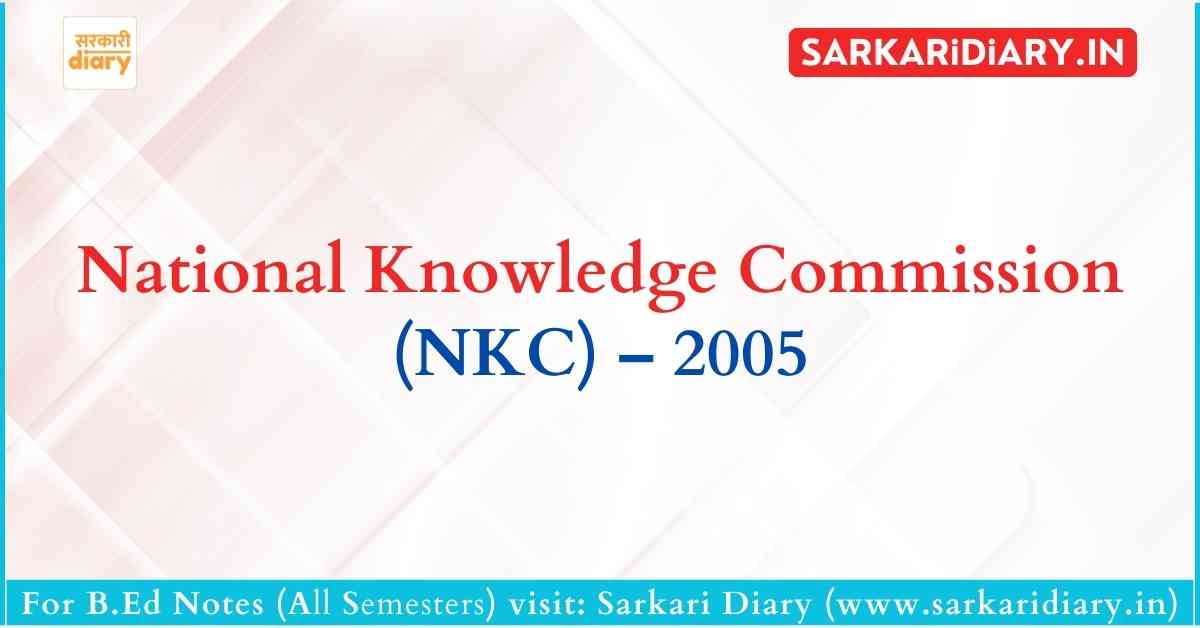A nation’s strength in generating and utilizing knowledge capital is crucial to enhancing its citizens’ capabilities and empowering them. In the coming decades, India is expected to have the world’s largest youth population. Adopting a development approach centered around knowledge will help the country fully utilize this demographic opportunity. As the Prime Minister aptly stated, “The time has come to create a second wave of institution building and of excellence in the field of education, research and capability building so that we are better prepared for the 21st century.”

With this vision in mind, the National Knowledge Commission (NKC) was set up on 13th June 2005, with a working timeframe of three years, from 2nd October 2005 to 2nd October 2008. This high-level advisory body to the Prime Minister was tasked with proposing policies and reforms across vital sectors such as education, science and technology, agriculture, industry, and e-governance. The key goals of the Commission include facilitating easy access to knowledge, encouraging its creation and preservation, ensuring effective dissemination, and improving knowledge-related services.
Objectives
The primary objective of the NKC is to support the establishment of a vibrant, knowledge-based society in India. This involves significant reform of current knowledge systems, as well as the development of platforms for generating new knowledge. It is essential to promote broad participation and ensure equal access to knowledge for all sections of society.
To achieve this, the NKC aims to build appropriate institutional mechanisms to:
- Reinforce the education sector, encourage research and innovation within the country, and foster the application of knowledge in vital areas such as health, agriculture, and industry.
- Utilize information and communication technologies (ICTs) to improve governance and boost connectivity.
- Create frameworks for global-level interaction and exchange between various knowledge systems.
Key Focus Areas
NKC’s efforts are centered around five core dimensions of the knowledge ecosystem: access to knowledge, knowledge concepts, knowledge creation, knowledge application, and enhanced knowledge services.
Access to Knowledge
Facilitating access to knowledge is essential for expanding opportunities for individuals and communities. There must be systems in place that allow people who are capable of receiving and understanding information to access it easily. This includes transparency in government operations and public access to reliable state-related information. The NKC is examining the following areas under this topic:
- Right to Education
- Language Policies
- Translation Services
- Library Systems
- Network Infrastructure
- Digital Portals
Knowledge Concepts
Knowledge is structured, conveyed, and propagated primarily through the education system. Education allows individuals to make informed decisions, stay updated with societal developments, and question socio-economic structures in ways that lead to growth and change. NKC’s work in this area spans a broad spectrum of the Indian education framework, including:
- Primary and Secondary Education
- Vocational Training
- Higher Education
- Medical Studies
- Legal Education
- Management Education
- Engineering Education
- Distance and Open Learning
- Open Educational Resources
- Developing Talent in Math and Science
- Increasing Quality Ph.D. Graduates
Creation of Knowledge
A nation progresses either by optimizing the use of existing resources or by discovering new ones—both of which rely on knowledge creation. Activities that lead to knowledge generation or safeguard created knowledge are vital. Therefore, India must give attention to areas such as:
- Advancements in Science and Technology
- Legal Frameworks for Publicly Funded Research
- Intellectual Property Rights
- Fostering Innovation
- Promoting Entrepreneurship
Knowledge Application
The effective application of knowledge drives technological progress and supports a continuous flow of useful information. This necessitates significant investment in goal-oriented research and development and simplified systems to support market and industrial activities. Practical use of knowledge in agriculture, traditional knowledge systems, and small & medium enterprises (SMEs) can make a meaningful difference in rural communities. Focus areas include:
- Traditional Knowledge Systems
- Agricultural Development
- Improving Quality of Life
Delivery of Knowledge Services
Knowledge-related services can streamline various citizen–state interaction points, which have historically been prone to inefficiencies and corruption. The use of technology, particularly e-governance, presents an opportunity to enhance accountability, efficiency, and transparency in public service delivery. NKC follows a structured approach, which includes:
- Identifying strategic priority areas
- Recognizing stakeholders and analyzing critical issues
- Forming expert Working Groups, organizing workshops, and conducting broad consultations
- Engaging with relevant government ministries and the Planning Commission
- Finalizing policy suggestions in the form of recommendation letters to the Prime Minister
- Submitting detailed recommendation letters, including action steps and financial implications
- Broadly disseminating recommendations via state governments, civil society, and the NKC website
- Assisting in implementation under PMO guidance
- Refining recommendations based on feedback and supporting proposal execution
This detailed, structured approach by the National Knowledge Commission was aimed at building a robust knowledge economy, empowering all citizens, and positioning India as a global leader in knowledge creation and application.